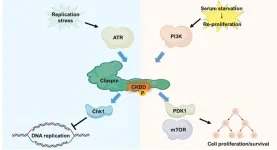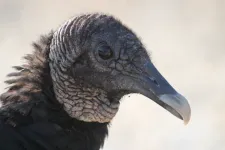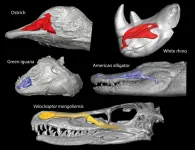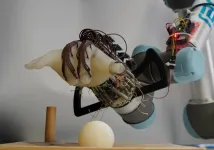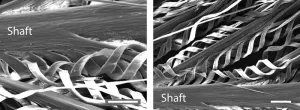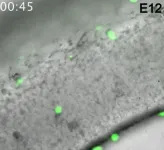(Press-News.org) In 1918, the American chemist Irving Langmuir published a paper examining the behavior of gas molecules sticking to a solid surface. Guided by the results of careful experiments, as well as his theory that solids offer discrete sites for the gas molecules to fill, he worked out a series of equations that describe how much gas will stick, given the pressure.
Now, about a hundred years later, an “AI scientist” developed by researchers at IBM Research, Samsung AI, and the University of Maryland, Baltimore County (UMBC) has reproduced a key part of Langmuir’s Nobel Prize-winning work. The system—artificial intelligence (AI) functioning as a scientist—also rediscovered Kepler’s third law of planetary motion, which can calculate the time it takes one space object to orbit another given the distance separating them, and produced a good approximation of Einstein’s relativistic time-dilation law, which shows that time slows down for fast-moving objects.
The research was supported by the Defense Advanced Research Projects Agency (DARPA). A paper describing the results will be published in the journal Nature Communications on April 12.
A machine-learning tool that reasons
The new AI scientist—dubbed “AI-Descartes” by the researchers—joins the likes of AI Feynman and other recently developed computing tools that aim to speed up scientific discovery. At the core of these systems is a concept called symbolic regression, which finds equations to fit data. Given basic operators, such as addition, multiplication, and division, the systems can generate hundreds to millions of candidate equations, searching for the ones that most accurately describe the relationships in the data.
AI-Descartes offers a few advantages over other systems, but its most distinctive feature is its ability to logically reason, says Cristina Cornelio, a research scientist at Samsung AI in Cambridge, England who is first author on the paper. If there are multiple candidate equations that fit the data well, the system identifies which equations fit best with background scientific theory. The ability to reason also distinguishes the system from “generative AI” programs such as ChatGPT, whose large language model has limited logical skills and sometimes messes up basic math.
“In our work, we are merging a first-principles approach, which has been used by scientists for centuries to derive new formulas from existing background theories, with a data-driven approach that is more common in the machine learning era,” Cornelio says. “This combination allows us to take advantage of both approaches and create more accurate and meaningful models for a wide range of applications.”
The name AI-Descartes is a nod to 17th-century mathematician and philosopher René Descartes, who argued that the natural world could be described by a few fundamental physical laws and that logical deduction played a key role in scientific discovery.
Suited for real-world data
The system works particularly well on noisy, real-world data, which can trip up traditional symbolic regression programs that might overlook the real signal in an effort to find formulas that capture every errant zig and zag of the data. It also handles small data sets well, even finding reliable equations when fed as few as ten data points.
One factor that might slow down the adoption of a tool like AI-Descartes for frontier science is the need to identify and code associated background theory for open scientific questions. The team is working to create new datasets that contain both real measurement data and an associated background theory to refine their system and test it on new terrain.
They would also like to eventually train computers to read scientific papers and construct the background theory themselves.
“In this work, we needed human experts to write down, in formal, computer-readable terms, what the axioms of the background theory are, and if the human missed any or got any of those wrong, the system won't work,” says co-author Tyler Josephson, assistant professor of Chemical, Biochemical and Environmental Engineering at UMBC. “In the future,” he says, “we'd like to automate this part of the work as well, so we can explore many more areas of science and engineering.”
This goal motivates Josephson’s research on AI tools to advance chemical engineering.
Ultimately, the team hopes their AI-Descartes, like the real person, may inspire a productive new approach to science. “One of the most exciting aspects of our work is the potential to make significant advances in scientific research,” Cornelio says.
END
New “AI scientist” combines theory and data to discover scientific equations
The system demonstrated its chops on Kepler’s third law of planetary motion, Einstein’s relativistic time-dilation law, and Langmuir’s equation of gas adsorption.
2023-04-12
ELSE PRESS RELEASES FROM THIS DATE:
When cells sense the cue for growth
2023-04-12
Researchers of the Genome Dynamics Project team at Tokyo Metropolitan Institute of Medical Science ·revealed new mechanism controlling cellular proliferation in response to serum, which triggers growth of resting cells.
One of the key pathways for cellular growth is the phosphoinositide 3-kinase (PI3K) –mTOR (mechanistic/mammalian target of rapamycin) pathway. mTOR regulates the cellular response to nutrient availability. Dysregulation of the mTOR signaling pathway is intimately involved in many human diseases, especially the multitude of different human cancers. This ...
Most plastic eaten by city vultures comes straight from food outlets
2023-04-12
Since the 1950s, humanity has produced an estimated 8.3bn tons of plastic, adding a further 380m tons to this amount each year. Only 9% of this gets recycled. The inevitable result is that plastic is everywhere, from the depths of the oceans to the summit of Everest – and notoriously, inside the tissues of humans and other organisms.
The long-term effects of ingested plastic on people aren’t yet known. But in rodents, ingested microplastics can impair the function of the liver, intestines, and exocrine and reproductive organs.
Especially ...
To more effectively sequester biomass and carbon, just add salt
2023-04-12
Reducing global greenhouse gas emissions is critical to avoiding a climate disaster, but current carbon removal methods are proving to be inadequate and costly. Now researchers from the University of California, Berkeley, have proposed a scalable solution that uses simple, inexpensive technologies to remove carbon from our atmosphere and safely store it for thousands of years.
As reported today in the journal Proceedings of the National Academy of Sciences, researchers propose growing biomass crops to capture carbon from the air, then burying the harvested vegetation in engineered dry biolandfills. This ...
How to cool your brain? These warm-blooded animals use their nose
2023-04-12
A research team led by Seishiro Tada and Takanobu Tsuihiji of the University of Tokyo shows that the living warm-blooded descendants of theropod dinosaurs evolved a better nasal cooling system aided by larger nasal cavities than cold-blooded animals. The study provides clues to the evolution of nasal cooling in warm-blooded animals from their theropod dinosaur ancestors.
Endotherms, or warm-blooded animals, maintain their high body temperature through internal heat sources. Birds, humans, and other mammals are endotherms. But ectotherms, or cold-blooded animals such as reptiles, use external heat sources to keep ...
It’s all in the wrist: energy-efficient robot hand learns how not to drop the ball
2023-04-12
Researchers have designed a low-cost, energy-efficient robotic hand that can grasp a range of objects – and not drop them – using just the movement of its wrist and the feeling in its ‘skin’.
Grasping objects of different sizes, shapes and textures is a problem that is easy for a human, but challenging for a robot. Researchers from the University of Cambridge designed a soft, 3D printed robotic hand that cannot independently move its fingers but can still carry out a range of complex movements.
The robot hand was trained to ...
How an African bird might inspire a better water bottle
2023-04-12
An extreme closeup of feathers from a bird with an uncanny ability to hold water while it flies could inspire the next generation of absorbent materials.
With high resolution microscopes and 3D technology, researchers at Johns Hopkins University and Massachusetts Institute of Technology captured an unprecedented view of feathers from the desert-dwelling sandgrouse, showcasing the singular architecture of their feathers and revealing for the first time how they can hold so much water.
“It’s super fascinating to see how nature managed to create structures so perfectly efficient to take ...
Time-restricted fasting could cause fertility problems
2023-04-12
Time-restricted fasting diets could cause fertility problems according to new research from the University of East Anglia.
A new study published today shows that time-restricted fasting affects reproduction differently in male and female zebrafish.
Importantly, some of the negative effects on eggs and sperm quality can be seen after the fish returned to their normal levels of food consumption.
The research team say that while the study was conducted in fish, their findings highlight the importance of considering not just the effect of fasting on weight and health, but also on fertility.
Prof Alexei Maklakov, from UEA’s School of Biological Sciences, said: “Time-restricted ...
Scientists uncover the amazing way sandgrouse hold water in their feathers
2023-04-12
Many birds’ feathers are remarkably efficient at shedding water — so much so that “like water off a duck’s back” is a common expression. Much more unusual are the belly feathers of the sandgrouse, especially Namaqua sandgrouse, which absorb and retain water so efficiently the male birds can fly more than 20 kilometers from a distant watering hole back to the nest and still retain enough water in their feathers for the chicks to drink and sustain themselves in the searing deserts ...
Alternative route used by specialized immune cells to colonize the embryonic brain suggests new approach to fighting fetal brain dysfunction
2023-04-12
A team from the Nagoya University Graduate School of Medicine in Japan has uncovered new information about how microglia, the resident immune cells in the brain, colonize the brain during the embryonic stage of development. Although erythromyeloid progenitors (EMPs) were previously thought to divide into either microglia or macrophages, the group found that macrophages that enter the brain primordium —the brain in its earliest recognizable stage of development— can become microglia at later stages of development. These findings demonstrate the plasticity of these ...
The brain’s cannabinoid system protects against addiction following childhood maltreatment
2023-04-12
High levels of the body’s own cannabinoid substances protect against developing addiction in individuals previously exposed to childhood maltreatment, according to a new study from Linköping University in Sweden. The brains of those who had not developed an addiction following childhood maltreatment seem to process emotion-related social signals better.
Childhood maltreatment has long been suspected to increase the risk of developing a drug or alcohol addiction later in life. Researchers at Linköping University have previously shown that this risk is three times higher if you have been exposed to childhood maltreatment ...
LAST 30 PRESS RELEASES:
Low-intensity treadmill exercise preconditioning mitigates post-stroke injury in mouse models
How moss helped solve a grave-robbing mystery
How much sleep do teens get? Six-seven hours.
Patients regain weight rapidly after stopping weight loss drugs – but still keep off a quarter of weight lost
GLP-1 diabetes drugs linked to reduced risk of addiction and substance-related death
Councils face industry legal threats for campaigns warning against wood burning stoves
GLP-1 medications get at the heart of addiction: study
Global trauma study highlights shared learning as interest in whole blood resurges
Almost a third of Gen Z men agree a wife should obey her husband
Trapping light on thermal photodetectors shatters speed records
New review highlights the future of tubular solid oxide fuel cells for clean energy systems
Pig farm ammonia pollution may indirectly accelerate climate warming, new study finds
Modified biochar helps compost retain nitrogen and build richer soil organic matter
First gene regulation clinical trials for epilepsy show promising results
Life-changing drug identified for children with rare epilepsy
Husker researchers collaborate to explore fear of spiders
Mayo Clinic researchers discover hidden brain map that may improve epilepsy care
NYCST announces Round 2 Awards for space technology projects
How the Dobbs decision and abortion restrictions changed where medical students apply to residency programs
Microwave frying can help lower oil content for healthier French fries
In MS, wearable sensors may help identify people at risk of worsening disability
Study: Football associated with nearly one in five brain injuries in youth sports
Machine-learning immune-system analysis study may hold clues to personalized medicine
A promising potential therapeutic strategy for Rett syndrome
How time changes impact public sentiment in the U.S.
Analysis of charred food in pot reveals that prehistoric Europeans had surprisingly complex cuisines
As a whole, LGB+ workers in the NHS do not experience pay gaps compared to their heterosexual colleagues
How cocaine rewires the brain to drive relapse
Mosquito monitoring through sound - implications for AI species recognition
UCLA researchers engineer CAR-T cells to target hard-to-treat solid tumors
[Press-News.org] New “AI scientist” combines theory and data to discover scientific equationsThe system demonstrated its chops on Kepler’s third law of planetary motion, Einstein’s relativistic time-dilation law, and Langmuir’s equation of gas adsorption.
